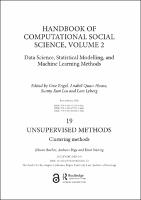Chapter 19 Unsupervised Methods
Proposal review
Clustering Methods
| dc.contributor.author | Bacher, Johann | |
| dc.contributor.author | Pöge, Andreas | |
| dc.contributor.author | Wenzig, Knut | |
| dc.date.accessioned | 2022-08-02T09:57:12Z | |
| dc.date.available | 2022-08-02T09:57:12Z | |
| dc.date.issued | 2022 | |
| dc.identifier.uri | https://library.oapen.org/handle/20.500.12657/57709 | |
| dc.description.abstract | The Handbook of Computational Social Science is a comprehensive reference source for scholars across multiple disciplines. It outlines key debates in the field, showcasing novel statistical modeling and machine learning methods, and draws from specific case studies to demonstrate the opportunities and challenges in CSS approaches. The Handbook is divided into two volumes written by outstanding, internationally renowned scholars in the field. This second volume focuses on foundations and advances in data science, statistical modeling, and machine learning. It covers a range of key issues, including the management of big data in terms of record linkage, streaming, and missing data. Machine learning, agent-based and statistical modeling, as well as data quality in relation to digital trace and textual data, as well as probability, non-probability, and crowdsourced samples represent further foci. The volume not only makes major contributions to the consolidation of this growing research field, but also encourages growth into new directions. With its broad coverage of perspectives (theoretical, methodological, computational), international scope, and interdisciplinary approach, this important resource is integral reading for advanced undergraduates, postgraduates, and researchers engaging with computational methods across the social sciences, as well as those within the scientific and engineering sectors. | en_US |
| dc.language | English | en_US |
| dc.subject.classification | thema EDItEUR::U Computing and Information Technology::UY Computer science | en_US |
| dc.subject.classification | thema EDItEUR::J Society and Social Sciences::JM Psychology | en_US |
| dc.subject.classification | thema EDItEUR::J Society and Social Sciences::JM Psychology::JMB Psychological methodology | en_US |
| dc.subject.other | survey data, data analysis, data science, information technology, AI, socio-robotics, quantitative, survey methodology, ethics, ethical standards, privacy, replication, politics, survey design, social media, big data, social, human-robot interaction, machine learning, open data, data archives, data ownership, digital trace, unstructured data | en_US |
| dc.title | Chapter 19 Unsupervised Methods | en_US |
| dc.title.alternative | Clustering Methods | en_US |
| dc.type | chapter | |
| oapen.identifier.doi | 10.4324/9781003025245-23 | en_US |
| oapen.relation.isPublishedBy | 7b3c7b10-5b1e-40b3-860e-c6dd5197f0bb | en_US |
| oapen.relation.isPartOfBook | 866251e4-af21-49fd-a795-9950f3c15530 | en_US |
| oapen.relation.isbn | 9780367457808 | en_US |
| oapen.relation.isbn | 9781032077703 | en_US |
| oapen.imprint | Routledge | en_US |
| oapen.pages | 19 | en_US |
| oapen.remark.public | Funder name: Johannes Kepler University Linz, Institute of Sociology | |
| peerreview.anonymity | Single-anonymised | |
| peerreview.id | bc80075c-96cc-4740-a9f3-a234bc2598f1 | |
| peerreview.open.review | No | |
| peerreview.publish.responsibility | Publisher | |
| peerreview.review.stage | Pre-publication | |
| peerreview.review.type | Proposal | |
| peerreview.reviewer.type | Internal editor | |
| peerreview.reviewer.type | External peer reviewer | |
| peerreview.title | Proposal review | |
| oapen.review.comments | Taylor & Francis open access titles are reviewed as a minimum at proposal stage by at least two external peer reviewers and an internal editor (additional reviews may be sought and additional content reviewed as required). |

